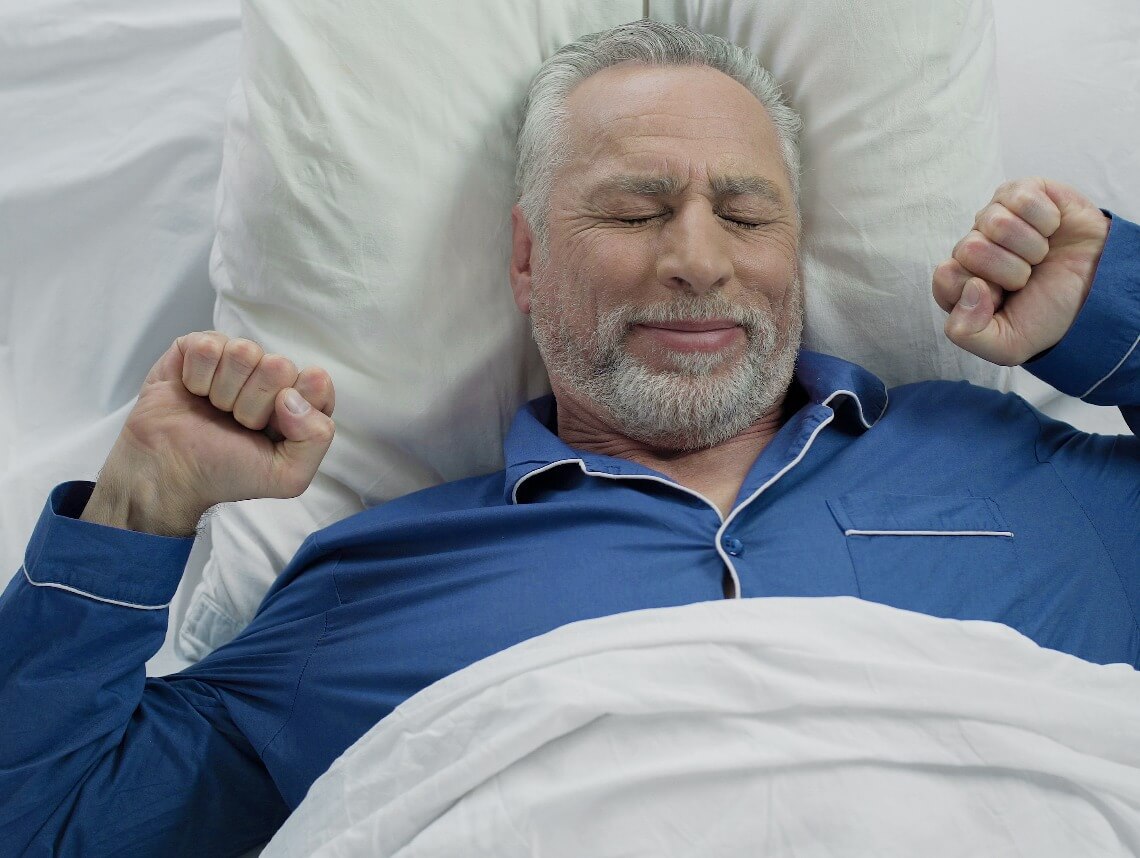Getting a restful night of sleep is just as important to your health as having the right amount of nutrients in your diet. Aside from protecting against many (sometimes serious) health conditions, sleep helps to improve concentration, memory formation, and even our immune systems.
Unfortunately for seniors, rest doesn’t always come easy. Statistics show that over half of all Americans over the age of 64 have sleep disorders preventing them from getting a full night of sleep. Take a look at each stage of the sleep cycle below along with ways to help you or a loved one sleep better at night.
The 5 Stages of Sleep
Our bodies go through five stages of sleep every night (1, 2, 3, 4 and REM) – a cycle that repeats itself every 90 minutes or so.
Stage 1 results in a period of light sleep in which individuals may be easily awakened.
During Stage 2, the body prepares itself for deep sleep, reducing eye movement and muscle activity.
Stages 3 and 4 are often referred to as Deep Sleep. During this time, eye movement and muscle activity subside, putting an individual in a deep, uninterrupted sleep. This is also the time when individuals might experience night terrors or sleepwalking.
During REM (Rapid Eye Movement) sleep, breathing becomes more rapid and irregular, brain activity heightens (similar to when an individual is awake) and an individual may start to experience dreams.
This pattern of sleep is crucial to the overall health and wellness of a senior. Without a restful night of sleep, individuals are more likely to experience depression, impaired judgment, increased pain, and a weakened immune response.
Why Do Seniors Have Difficulty Sleeping?
According to the National Sleep Foundation, seniors typically need 7 to 9 hours of sleep every night, but nearly half of all individuals over the age of 65 have difficulty doing so for a number of reasons:
- As we age, our bodies produce less melatonin, a chemical responsible for promoting sleep.
- As we age, we also become more sensitive to noise and other changes in our environment.
- Sleep schedules often change as we age, causing individuals to become tired earlier in the day and awake earlier in the morning.
- Snoring and sleep apnea are two of the most common reasons for sleep disruption, affecting more than 90 million Americans every year (many of those are over the age of 65)
- Sleep disorders (ex: insomnia) are common among seniors (44% of older adults experience symptoms of insomnia every week).
- Restless leg syndrome (RLS) and other health conditions (menopause, multiple sclerosis, Parkinson’s, etc.) are also common among seniors and may also cause sleep disruptions.
Sleep Tips For a Restful Night of Sleep
According to one study, 13% of men and 36% of women report having to wait over 30 minutes to fall asleep at night.
To help promote healthy sleep (not only falling asleep but staying asleep), here are a few lifestyle and environmental changes to consider:
- Eliminate distractions in the bedroom or guest room (including televisions, computers, telephones, bright lights, etc.).
- Avoid caffeine and alcohol at least 3 hours prior to bedtime.
- Put on calm, relaxing meditative music before bedtime.
- Take naps throughout the day if needed (to promote a healthy sleep schedule)
- Maintain a healthy diet and daily routine. Exercising 20-30 minutes every day can help relax your body and promote sleep.
- Practice relaxation and stress-relieving techniques before bed.
- Consult a physician or sleep specialist to be sure there are no underlying medical conditions preventing you or your loved one from experiencing a full night of rest.
Related blogs: Sleep Tips for Seniors: 5 Tips to Help Loved Ones With Trouble Sleeping
Contact Sonas for Home Health Care Services
At Sonas Home Health Care, we understand the importance of rest and relaxation. We also know that for family caregivers, this can be difficult to achieve at times. We refer loving and competent caregivers to provide respite care to families in need – from a few hours a day to around-the-clock care.
Contact us directly to speak with a home health care professional or Request a Free In-Home Assessment. Together we can determine the right plan of action for your family.
If you or an aging loved one are considering home health care services in Florida, contact the caring staff at Sonas Home Health Care. Call today (888) 592-5855.
This blog was reviewed by Jillian Miller BSN, RN — Director of Nursing for Sonas Home Health Care’s Tampa Bay market — for clinical accuracy. Jillian Miller has been a nurse for 16 years — working primarily in pediatrics. She believes the best part of working with the pediatric population is when you see smiles from clients when you first enter the room. She loves seeing the difference you can make in families’ lives while providing the best care possible for them.

